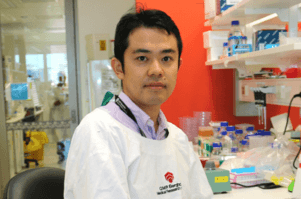
Blood cancer research
Targeting the inflammatory microenvironment in multiple myeloma

Dr Kyohei Nakamura
Kyohei is a Research Officer at QIMR Berghofer Medical Research Institute. Originally from Japan, he completed his M.D and PhD at Tohoku University, Sendai, before relocating to Queensland.
During his PhD, Kyohei studied a type of tumour cells called Natural Killer cells and revealed one of the mechanisms of how tumour cells escape from control by NK cells. He also studied inflammation biology, and was awarded the Ikushi Prize by the Japanese Society for the Promotion of Science in recognition of his work.
In April 2015, Kyohei relocated to Queensland and started his post-doctoral training under Professor Mark Smyth, an internationally recognised expert in cancer immunology. Here, Kyohei’s research has been focused on multiple myeloma, a type of blood cancer.
Dr Kyohei Nakamura's research
The growth of multiple myeloma occurs in the bone marrow, where myeloma triggers tissue injury (such as bone damage). Kyohei hypothesised that inflammation induced by tissue injury might drive myeloma progression. So far, his project has successfully identified a critical inflammatory factor that promotes myeloma progression. He also found that an increased level of this factor predicts poor prognosis in myeloma patients, so targeting this factor might be a potential approach for myeloma treatment.
During his clinical training, Kyohei saw multiple myeloma patients suffering from symptoms such as bone pain, paralysis, or infection. As multiple myeloma mainly occurs in the elderly, it presents challenges for clinicians who must treat patients with age-related complications.
Kyohei believes that there’s real reason for optimism. While multiple myeloma is widely recognised as being incurable, emerging therapies have shown remarkable promise in clinical trials. ‘I believe a cure will be within reach in the near future; researchers including me are intensively working for this purpose.’
The importance of funding
For Kyohei, the Cure Cancer Australia grant has provided support both financially and emotionally. ‘I have been further motivated to promote my research since I received this grant, and have devoted myself to bringing hope to patients,’ he says. ‘There is a pressing need for effective and tolerable therapy for patients. With great support from the Cure Cancer Australia Grant, I hope to make a real difference.’
Kyohei is co-funded by Cure Cancer Australia and Cancer Australia.
‘I believe a cure will be within reach in the near future; researchers including me are intensively working for this purpose.’
Related Blog Posts

Immunotherapy and precision medicine in breast cancer: Two p...

Celebrating Bold Ideas: Highlights from the 2025 Researcher ...

From Cure Cancer grant to global impact: Prof Angela Hong’...

Lunch & Learn series
Find out about the latest developments in cancer research first hand from our researchers and the impact of your support.
We take on every cancer
Cure Cancer funds ground breaking research across every cancer, no matter the size or rarity.
We aim to maximise our impact, save millions of lives, and leaves no one behind.

Our research grant program
We are dedicated to funding new innovative cancer research projects, giving talented emerging cancer researchers the opportunity to pursue their innovative ideas across diverse areas of cancer research.
Through our Research Grants Program, we commit to back new ideas from the most brilliant minds in cancer research.
Let's stay in touch
To receive updates on our work, campaigns and our impact in cancer research, subscribe to our newsletter.














